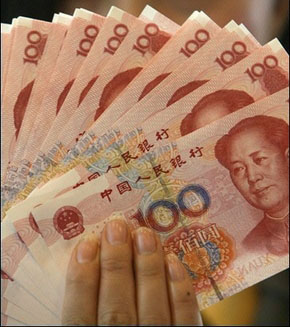
China's currency: Can't have it all… Source: Google Images
In today’s CSFB column on China (see below), Dong Tao and Christiaan Tuntono report that PBoC Governor Zhou Xiaochuan commented that China would like greater monetary policy flexibility in order to combat inflation. Not that inflation is so high in China, but the Asian giant’s return to breakneck rates of growth (11.9% growth year-on-year in 1Q10) may push prices higher. But, the Chinese are surely aware that in the world of economics, you cannot have your cake and eat it too.
Remember the so-called “Mundell Trilemma,” named after ground-breaking economist Robert Mundell, who with Marcus Fleming at the IMF in the 1960s critiqued, or better, refined Keynesianism. They analyzed the effects of monetary and fiscal policies under different exchange rate regimes (fixed or flexible) and under capital mobility (or not). The Mundell Trilemma posits that you cannot have all three of: fixed exchange rates (which China has held to tenaciously, much to the chagrin of balance of payments deficit countries like the US); monetary policy flexibility (which Mr. Zhou announced today he would like); and, capital mobility (on which the Chinese export juggernaut depends — i.e. FDI and other capital inflows). So, the Chinese have given up monetary policy flexibility in exchange for $2.4 trillion in fx reserves and rising. Excessively easy US monetary policy for many years (thank you, Sir Alan) has led to easy money in China, sometimes resulting in an inflation problem, though not of late. Effectively, the Federal Reserve determines the money supply in China.
Do Mr. Zhou’s comments presage a more flexible exchange rate in China (aka a revaluation of the woefully undervalued RMB)? Do we have one more set of tea leaves to read on China’s policy intentions — in addition to the U.S. government’s agreement to postpone calling China a currency manipulator in exchange for China’s cooperation on sanctions against Iran and a commitment to at least slowly revalue the RMB? In any case, Mr. Zhou can’t have his desired monetary policy flexiblity without floating his currency.
From CSFB 4/26/10:
China
Dong Tao
+852 2101 7469
[email protected]
Christiaan Tuntono
+852 2101 7409
[email protected]
PBoC Governor Zhou Xiaochuan highlighted the importance of inflation management and policy flexibility for China’s monetary policy. Zhou made his latest comments on China’s monetary policy during his attendance at the G20 meeting in Washington DC. Although the importance of policy continuity and consistency remains intact, greater weight appears to have been attributed to the focus and flexibility of policy measures in view of the potential rise of new economic conditions. At the same time, Zhou also stressed the importance of monitoring price movements and managing inflation expectations in his comments. We think Zhou’s comments reflect the PBoC’s concern about the rise of inflationary pressure in China, and its readiness to adjust the existing policy stance to cope with any new situation. The same message was also conveyed in the PBoC’s 1Q10 macro economic analysis published on 23 April, in our view. The report acknowledged the further strengthening of economic momentum, and identified the management of liquidity, credit growth, and price stability as the PBoC’s main tasks. The central bank also said that it will continue to maintain the balance between growth, structural adjustments, and inflation expectations going forward. The PBoC’s heightened focus on inflationary pressures is in line with our expectation for price levels to rise in 2010 on higher food prices and housing rents. Higher inflation is likely to drag real deposit rates into negative territory, prompting the central bank to raise rates in 2H10, in our view.
Meantime, the Chinese government has reportedly been studying the launch of a new round of stimulus measures, despite the fact that the economy grew by 11.9% yoy in 1Q10. This time, we understand the focus will be on helping economic transformation and establishing competitiveness in selected industries instead of boosting GDP per se. The plan is still at an early stage, but it could be as big as the RMB4trn package launched in late 2008 that prevented the Chinese economy from falling into recession. There is clearly a policy desire to upgrade and transform the economy, as China’s export engine may enter into a structural moderation amidst reduced US consumption and RMB appreciation. Unlike the emphasis on infrastructure investment in the previous stimulus package, we think the government intends to let private capital play a much bigger role this time.